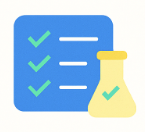Testing Strategies in Clean Architecture
Explore practical testing techniques for iOS apps using Clean Architecture. Learn how to isolate, mock, and verify business logic at every layer.

Why Testing Matters in Clean Architecture
Clean Architecture separates your app into distinct layers — UI, Domain, and Data. This modularity makes testing each part in isolation not just possible, but essential for building scalable, reliable apps.
Layered Testing Approach
- Unit Tests: Test UseCases and ViewModels independently using mocks or stubs.
- Integration Tests: Test interactions between Repository and Data Sources.
- UI Tests: Validate user flows and view rendering using XCUITest or snapshots.
Mocking Strategies
Use protocols and dependency injection to replace real implementations with mock or fake services. This is especially powerful in unit testing your UseCases or ViewModels without hitting the network or database.
Test Coverage by Layer
- Domain: Focus on UseCases. Mock repositories.
- Data: Stub remote/local data sources. Test error flows.
- Presentation: Validate state transitions in ViewModels.
Best Practices
- Keep tests fast and deterministic
- Write tests before or alongside production code
- Use factories to simplify mock setup
- Automate tests in your CI pipeline
Conclusion
Testing in Clean Architecture ensures that each component works independently and together as a whole. With the right strategy, your team can ship confidently, reduce regressions, and scale your codebase safely.
Related Posts
- Clean Architecture in iOS
A beginner-friendly guide to structuring iOS projects using MVVM and Clean principles.
- Understanding Dependency Injection in iOS
Learn how DI improves modularity and testability in Swift apps.